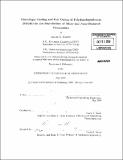Centrifugal casting and fast curing of polydimethylsiloxane (PDMS) for the manufacture of micro and nano featured components
Author(s)
Mazzeo, Aaron D. (Aaron David), 1979-
DownloadFull printable version (50.50Mb)
Other Contributors
Massachusetts Institute of Technology. Dept. of Mechanical Engineering.
Advisor
David E. Hardt.
Terms of use
Metadata
Show full item recordAbstract
The thermosetting resin polydimethylsiloxane (PDMS) is commonly used to prototype micro and nano featured components. In the field of microfluidics, PDMS-based devices have been used for cell sorting, cell culturing, microbioreactors, DNA sequencing, and immunoassays. In energy-related applications, PDMS has been used in fuel cell assemblies and as a material for transferring carbon nanotubes in the construction of solar cells. In addition, PDMS is the fundamental material of soft lithography and microcontact printing. Given the widespread use of PDMS in micro/nano technology, biology, and chemistry, the motivation of this thesis is to outline a viable manufacturing process for thermosetting resins such as PDMS that could be scaled-up for the large-scale production of micro/nano featured components. With respect to rate of PDMS device production, the two time-limiting steps in the typical prototyping process are degassing (bubble removal) and curing. To improve the degassing step, a novel centrifugal casting method is introduced, which permits simultaneous patterning of multiple surfaces and precise thickness control of a PDMS part. To improve the curing step, a custom-designed thermal management system heats and cools the PDMS. In centrifugal casting, the spinning time required to produce a bubble-free part is dependent on a distribution of critical bubble sizes, the centrifuge's spin speed profile, geometry, and fluid properties. A physical model predicting the spin time for bubble removal is verified by high speed video imaging and the production of bubble-free parts. (cont.) In addition to producing bubble-free parts, the PDMS centrifugal casting technique is utilized to produce micro and nano featured components.
Description
Thesis (Ph. D.)--Massachusetts Institute of Technology, Dept. of Mechanical Engineering, 2009. Cataloged from PDF version of thesis. Includes bibliographical references (p. 237-248).
Date issued
2009Department
Massachusetts Institute of Technology. Department of Mechanical EngineeringPublisher
Massachusetts Institute of Technology
Keywords
Mechanical Engineering.